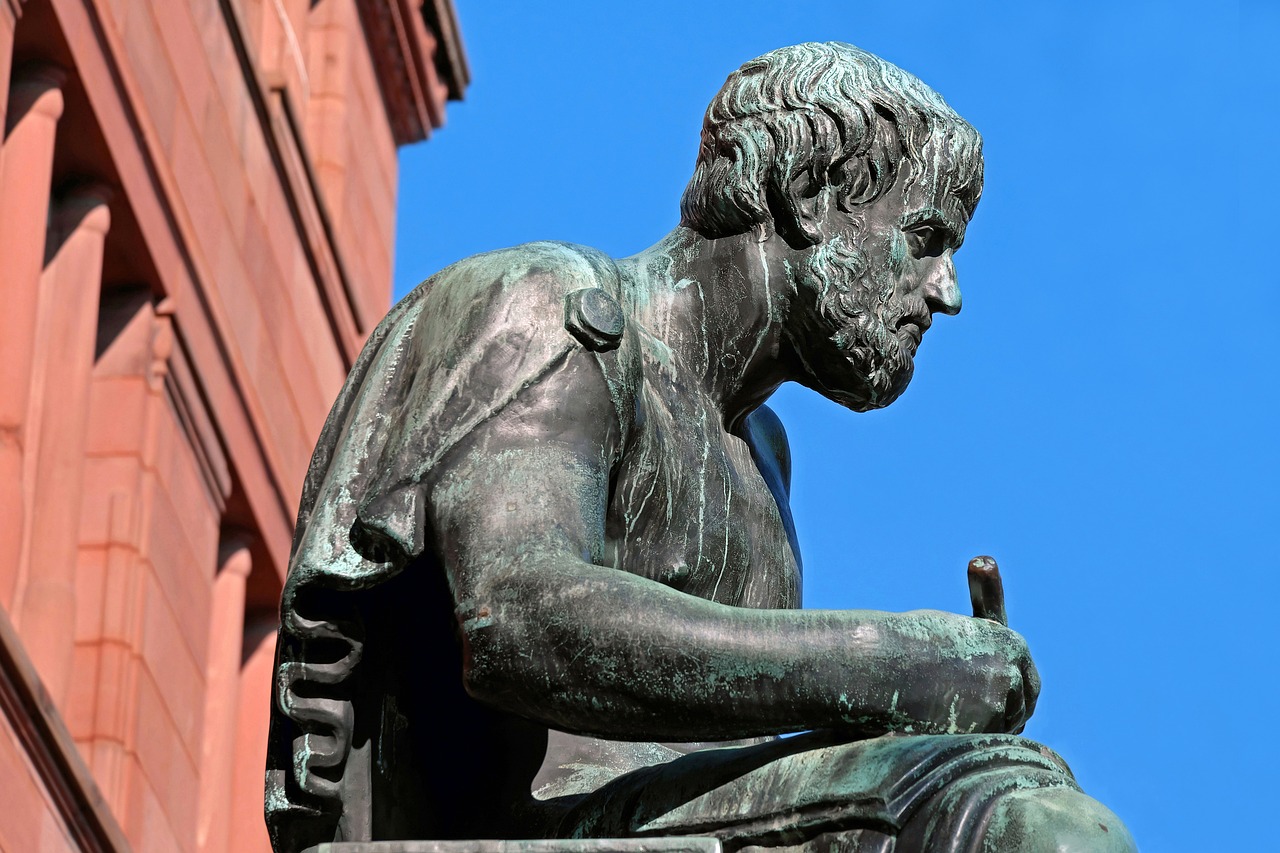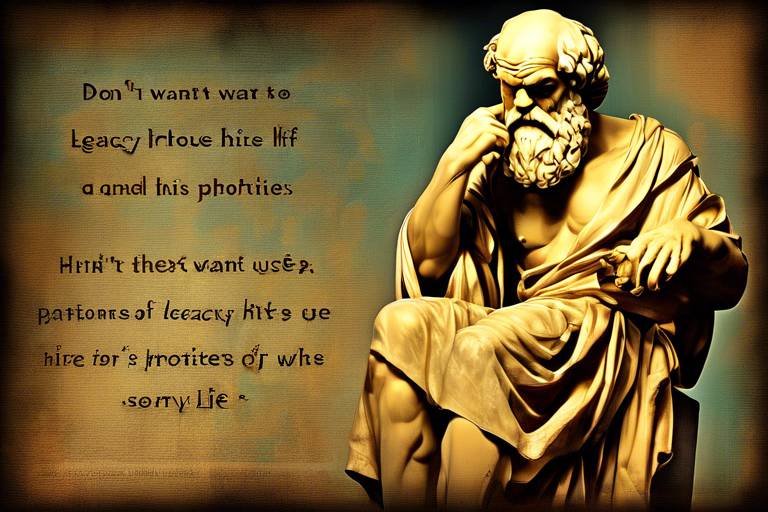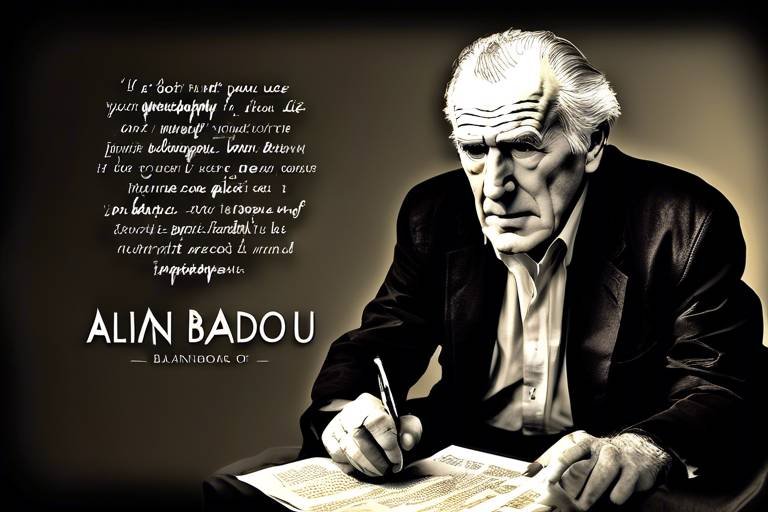Who are the Top Female Philosophers in History?
Throughout the annals of history, the contributions of female philosophers have often been overshadowed by their male counterparts. However, these remarkable women have profoundly shaped philosophical thought and challenged societal norms, paving the way for future generations. From ancient times to the contemporary era, female philosophers have tackled some of the most pressing questions of existence, ethics, and identity. Their insights not only reflect their unique perspectives but also resonate with the struggles they faced in a predominantly male-dominated field.
Take, for instance, the ancient philosopher Hypatia, who stood as a beacon of knowledge in Alexandria during the 4th century. Hypatia was not just a mathematician and astronomer; she was a philosopher who engaged with the works of Plato and Aristotle, offering critiques that were ahead of her time. Her tragic fate at the hands of a mob speaks volumes about the societal challenges women faced in intellectual pursuits. Yet, her legacy endures, inspiring countless women to pursue philosophy and science.
Fast forward to the 20th century, where Simone de Beauvoir emerged as a pivotal figure in existentialism and feminist philosophy. Her groundbreaking work, The Second Sex, challenged the traditional roles assigned to women, arguing that one is not born a woman but rather becomes one. Beauvoir's exploration of gender and identity laid the groundwork for modern feminist theory, emphasizing the importance of personal freedom and choice. Her ideas ignited discussions that continue to influence contemporary debates on gender equality.
As we delve deeper into the contributions of these female philosophers, it becomes clear that their ideas have not only enriched philosophical discourse but also sparked social movements and cultural shifts. They have addressed fundamental questions about the human condition, morality, and the nature of existence, often drawing from their lived experiences and the societal constraints they navigated. In doing so, they have opened up new avenues of thought and provided frameworks for understanding complex issues related to identity, ethics, and justice.
In examining the lives and works of these top female philosophers, we can appreciate the courage and resilience they exhibited in their pursuit of knowledge. Their legacies remind us that philosophy is not merely an academic discipline; it is a powerful tool for social change and personal liberation. As we explore the contributions of early female philosophers as well as those from the 20th century and beyond, we uncover a rich tapestry of thought that continues to inspire and challenge us today.
- Who was Hypatia and why is she significant?
Hypatia was a mathematician and philosopher in ancient Alexandria, known for her teachings on Neoplatonism and her tragic death, which highlighted the struggles of women in academia. - What is Simone de Beauvoir's main contribution to philosophy?
Simone de Beauvoir is best known for her work The Second Sex, which critiques the historical oppression of women and explores the concept of gender as a social construct. - How did Hannah Arendt influence political philosophy?
Hannah Arendt reshaped political thought with her analysis of totalitarianism and her concept of the "banality of evil," emphasizing individual responsibility in political contexts. - What is Judith Butler's theory of gender performativity?
Judith Butler's theory posits that gender is not an inherent identity but rather a performance shaped by societal expectations, challenging traditional views on gender and identity.

Early Female Philosophers
The history of philosophy is often seen through a male lens, but the contributions of early female philosophers are both profound and essential. Women like Hypatia of Alexandria and Simone de Beauvoir not only paved the way for future thinkers but also challenged the status quo with their groundbreaking ideas. Hypatia, a mathematician and astronomer in ancient Egypt, was one of the first women to make significant contributions to philosophy, blending science and thought in a way that was revolutionary for her time. Her teachings emphasized the importance of reason and knowledge, which was a radical departure from the dogmatic beliefs that dominated the era.
Moving forward to the 20th century, we encounter Simone de Beauvoir, a key figure in existentialism and feminism. Her seminal work, The Second Sex, interrogated the nature of women's oppression and laid the groundwork for modern feminist theory. De Beauvoir famously stated, "One is not born, but rather becomes, a woman," encapsulating the idea that gender is a social construct rather than a fixed biological identity. Both Hypatia and de Beauvoir faced immense challenges in their fields, often battling societal norms that relegated women to the margins of intellectual discourse. Yet, their legacies endure, inspiring countless individuals to question, explore, and redefine the boundaries of philosophy.
To further illustrate the impact of these early female philosophers, let's look at a comparison of their contributions:
| Name | Time Period | Key Contributions |
|---|---|---|
| Hypatia | c. 360–415 AD | Combined mathematics, astronomy, and philosophy; promoted rational thought. |
| Simone de Beauvoir | 1908–1986 | Explored existentialism and feminism; challenged societal norms regarding gender. |
These pioneering women not only contributed to the philosophical landscape but also faced significant obstacles, including social ostracism and intellectual suppression. Their resilience in the face of adversity serves as a powerful reminder of the importance of diversity in philosophical discourse. By examining their lives and works, we gain insight into how female philosophers have shaped our understanding of ethics, existence, and the human condition.
As we reflect on the contributions of these early thinkers, it’s crucial to recognize that their ideas continue to resonate today. The struggles they faced mirror the ongoing fight for gender equality and representation in all fields, including philosophy. Their legacies challenge us to keep pushing boundaries and to ensure that the voices of women are heard and valued in the philosophical community.

20th Century Trailblazers
The 20th century was a remarkable period that witnessed the emergence of several influential female philosophers who challenged the status quo and reshaped modern thought. Among these trailblazers, Hannah Arendt and Iris Murdoch stand out for their unique perspectives on ethics, politics, and the human condition. Their contributions not only enriched philosophical discourse but also provided frameworks that continue to resonate in contemporary discussions. These women faced significant challenges in a predominantly male field, yet they persevered, leaving behind legacies that inspire future generations.
Hannah Arendt, a German-American philosopher, is best known for her profound analyses of totalitarianism and the nature of power. Her works, such as The Origins of Totalitarianism and The Human Condition, delve deep into the complexities of political life and the responsibilities of individuals within society. Arendt’s insights into the mechanisms of power and the role of the individual in political action have made her a pivotal figure in political philosophy. She argued that understanding the nature of evil is crucial, especially in the context of her groundbreaking concept of the banality of evil, which she introduced while examining the trial of Adolf Eichmann, a key figure in the Holocaust.
Arendt's political theory emphasizes the importance of individual action and responsibility, particularly in an increasingly complex world where the lines between good and evil can blur. Her exploration of totalitarianism highlighted how ordinary people can become complicit in horrific acts, thereby challenging traditional conceptions of morality. Through her work, Arendt urged us to recognize our agency and the power of our choices, reminding us that inaction can be as dangerous as action.
The banality of evil is perhaps Arendt's most controversial notion. She suggested that the perpetrators of horrific acts are often not monstrous figures but rather ordinary individuals who fail to think critically about their actions. This concept forces us to confront uncomfortable truths about human nature and the potential for evil that exists within us all. It raises essential questions: How do we ensure that we remain vigilant against the forces of oppression? How do we cultivate a sense of moral responsibility in our everyday lives?
Arendt's insights continue to resonate in contemporary discussions on governance and ethics. Her emphasis on the importance of public discourse and civic engagement has influenced scholars, activists, and policymakers striving for justice and accountability in political systems. Today, her work serves as a reminder of the need for critical engagement with our political realities, urging us to be active participants in shaping the world around us.
Alongside Arendt, Iris Murdoch made significant contributions to moral philosophy. Her writings emphasize the significance of love and imagination in ethical decision-making, offering a counter-narrative to more conventional utilitarian approaches. Murdoch believed that genuine moral insight requires a deep understanding of the complexities of human relationships and the moral dilemmas we face. Through her novels and philosophical essays, she explored the intricacies of human emotions and the moral implications of our choices.
Murdoch's approach to ethics challenges us to look beyond mere calculations of pleasure and pain. Instead, she invites us to consider the role of love in our moral lives. In her view, love is not just an emotion but a guiding principle that can lead us to deeper understanding and compassion for others. This perspective encourages us to engage with the world in a more profound way, fostering connections that transcend individual desires.
In summary, the 20th century was a transformative era for female philosophers like Hannah Arendt and Iris Murdoch. Their groundbreaking ideas and courageous explorations of complex issues have left an indelible mark on philosophy and continue to inspire new generations of thinkers. As we navigate the challenges of our time, their legacies remind us of the importance of critical thought, moral responsibility, and the power of love in shaping a better world.
- Who was Hannah Arendt? Hannah Arendt was a German-American philosopher known for her work on totalitarianism and the nature of power.
- What is the banality of evil? The banality of evil is a concept introduced by Arendt, suggesting that ordinary people can commit horrific acts without being inherently evil.
- What did Iris Murdoch contribute to philosophy? Iris Murdoch emphasized the importance of love and imagination in ethical decision-making, challenging traditional utilitarian views.
- How did these philosophers impact modern thought? Both Arendt and Murdoch reshaped discussions in ethics and political philosophy, influencing contemporary debates on morality, governance, and human relationships.

Hannah Arendt's Political Theory
Hannah Arendt, a towering figure in political philosophy, has left an indelible mark on our understanding of power, authority, and the human condition. Born in 1906, her experiences as a Jewish woman in Europe during the rise of totalitarian regimes deeply influenced her work. Arendt's political theory is not just about abstract concepts; it is a profound exploration of the human experience in the face of political oppression. One of her most significant contributions is her analysis of totalitarianism, which she articulated in her groundbreaking book, The Origins of Totalitarianism. In this work, she meticulously examines the mechanisms through which totalitarian regimes dismantle individual freedoms and establish control.
Arendt's insights into the nature of power are particularly striking. She argued that power is not merely the ability to coerce or control others; rather, it is fundamentally about the capacity to act in concert with others. This perspective shifts the focus from domination to collaboration, emphasizing the importance of collective action in political life. In her view, the essence of politics lies in the ability of individuals to come together and engage in meaningful dialogue, a concept that resonates strongly in today's fragmented political landscape.
Moreover, Arendt's exploration of the concept of “the public realm” is vital for understanding her political theory. She believed that the public sphere is where individuals can express their opinions and engage with one another, fostering a vibrant democracy. This idea is especially relevant today, as we navigate the complexities of social media and the challenges of maintaining a healthy public discourse. Arendt’s emphasis on the importance of active participation in the public realm serves as a call to action for individuals to reclaim their voices and responsibilities in a democratic society.
Arendt's work also delves into the themes of individual responsibility and moral judgment. She famously posited that individuals must take responsibility for their actions, even in the face of oppressive regimes. This idea culminated in her controversial concept of the “banality of evil,” which she articulated during the trial of Adolf Eichmann, a Nazi official. Arendt argued that Eichmann was not a monstrous figure but rather an ordinary bureaucrat who failed to think critically about his actions. This notion challenges traditional views of morality and compels us to confront the uncomfortable reality that ordinary people can commit heinous acts under specific political conditions.
In summary, Hannah Arendt's political theory is a rich tapestry woven from her experiences, observations, and profound insights into the nature of power, responsibility, and the public sphere. Her emphasis on collective action, individual responsibility, and the importance of engaging in the public realm continues to resonate today, making her work essential for anyone seeking to understand the complexities of modern political life.

Arendt's Concept of the
This article explores the contributions of influential female philosophers throughout history, highlighting their ideas, impact, and the challenges they faced in a male-dominated field.
This section delves into the contributions of early female philosophers, such as Hypatia and Simone de Beauvoir, who laid the groundwork for future generations through their groundbreaking ideas and writings.
Focusing on the 20th century, this section highlights female philosophers like Hannah Arendt and Iris Murdoch, who significantly influenced modern thought with their unique perspectives on ethics, politics, and existence.
Hannah Arendt's work on totalitarianism and the nature of power reshaped political philosophy, emphasizing the importance of individual action and responsibility in an increasingly complex world.
Hannah Arendt introduced the provocative notion of the banality of evil, a concept that challenges our understanding of morality in the context of political action. This idea emerged from her observations during the trial of Adolf Eichmann, a key architect of the Holocaust. Arendt portrayed Eichmann not as a monstrous figure but as an ordinary bureaucrat who, in her view, exemplified how the capacity for evil could manifest in mundane circumstances. She argued that his actions were not driven by hatred or fanaticism but by a disturbing adherence to duty and a failure to think critically about the consequences of his actions.
This perspective raises crucial questions about moral responsibility. If ordinary individuals can commit heinous acts simply by following orders, what does that say about the nature of evil? Arendt's work suggests that evil can be perpetuated by individuals who do not engage with their own moral compass, highlighting the dangers of conformity and blind obedience. This idea serves as a cautionary tale, reminding us that we must remain vigilant and thoughtful in our actions, especially in political contexts where authority can overshadow personal morality.
The implications of Arendt's concept extend beyond historical analysis. In contemporary discussions, her insights resonate in various fields, from ethics to political theory. They challenge us to confront uncomfortable truths about our own society and the potential for complicity in systemic injustices. As we navigate complex political landscapes, Arendt's work encourages us to reflect on our individual roles and responsibilities in shaping the world around us.
Arendt's insights continue to resonate in contemporary discussions on governance and ethics, influencing scholars and activists striving for justice and accountability in political systems. Her emphasis on the importance of individual action serves as a powerful reminder that change often begins with the courage to think critically and act decisively in the face of wrongdoing. As we grapple with issues of power, authority, and morality today, Arendt's legacy remains a vital source of inspiration and reflection.
Iris Murdoch's exploration of moral philosophy emphasizes the significance of love and imagination in ethical decision-making, offering a counter-narrative to more conventional utilitarian approaches.
This section highlights contemporary female philosophers like Judith Butler and Martha Nussbaum, who address issues of gender, identity, and ethics, shaping modern philosophical discourse with their innovative ideas.
Judith Butler's work on gender performativity challenges traditional notions of gender, advocating for a more fluid understanding of identity that has influenced feminist theory and LGBTQ+ discourse.
Nussbaum's capabilities approach redefines social justice, focusing on individual well-being and the importance of nurturing human capabilities, significantly impacting both philosophy and public policy.
- Who was Hannah Arendt? Hannah Arendt was a German-American philosopher and political theorist known for her works on totalitarianism, authority, and the nature of evil.
- What is the banality of evil? The banality of evil is a concept introduced by Arendt, suggesting that ordinary people can commit atrocious acts simply by conforming to authority without critical examination.
- How did Iris Murdoch contribute to philosophy? Iris Murdoch contributed to moral philosophy by emphasizing the roles of love and imagination in ethical decision-making, challenging traditional utilitarian views.
- What is Judith Butler known for? Judith Butler is known for her work on gender theory, particularly the concept of gender performativity, which argues that gender is a socially constructed performance rather than a fixed identity.
- What is Martha Nussbaum's capabilities approach? Nussbaum's capabilities approach focuses on enhancing individual well-being and social justice by recognizing and nurturing human capabilities.

Banality of Evil
This article explores the contributions of influential female philosophers throughout history, highlighting their ideas, impact, and the challenges they faced in a male-dominated field.
This section delves into the contributions of early female philosophers, such as Hypatia and Simone de Beauvoir, who laid the groundwork for future generations through their groundbreaking ideas and writings.
Focusing on the 20th century, this section highlights female philosophers like Hannah Arendt and Iris Murdoch, who significantly influenced modern thought with their unique perspectives on ethics, politics, and existence.
Hannah Arendt's work on totalitarianism and the nature of power reshaped political philosophy, emphasizing the importance of individual action and responsibility in an increasingly complex world.
Hannah Arendt's controversial notion of the emerged from her observations during the trial of Adolf Eichmann, a key figure in the Holocaust. She argued that Eichmann was not a monstrous villain, but rather an ordinary bureaucrat who failed to think critically about his actions. This realization was shocking; it suggested that evil can manifest not only through malevolence but also through thoughtlessness and conformity. Arendt proposed that when individuals do not engage with their moral responsibilities, they become complicit in horrific acts. This concept challenges traditional views of morality, which often portray evil as the result of deeply flawed individuals.
Arendt's insights lead us to consider the broader implications of her theory. She urged us to reflect on how societal pressures and institutional norms can encourage individuals to act against their moral compass. In essence, the posits that anyone, when placed in the right circumstances, can commit acts that are profoundly immoral. This idea resonates strongly today as we witness various forms of systemic injustice and atrocities around the world, prompting us to ask ourselves: How often do we turn a blind eye to the wrongs happening around us?
Arendt's insights continue to resonate in contemporary discussions on governance and ethics, influencing scholars and activists striving for justice and accountability in political systems. Her work compels us to confront uncomfortable truths about our own complicity in societal issues. By recognizing that evil can be banal, we are challenged to cultivate a culture of critical thinking and moral responsibility. This is crucial in ensuring that history does not repeat itself. The serves as a poignant reminder that vigilance, reflection, and active engagement in our communities are essential to prevent atrocities.
Iris Murdoch's exploration of moral philosophy emphasizes the significance of love and imagination in ethical decision-making, offering a counter-narrative to more conventional utilitarian approaches.
This section highlights contemporary female philosophers like Judith Butler and Martha Nussbaum, who address issues of gender, identity, and ethics, shaping modern philosophical discourse with their innovative ideas.
Judith Butler's work on gender performativity challenges traditional notions of gender, advocating for a more fluid understanding of identity that has influenced feminist theory and LGBTQ+ discourse.
Nussbaum's capabilities approach redefines social justice, focusing on individual well-being and the importance of nurturing human capabilities, significantly impacting both philosophy and public policy.
- What is the main idea behind the banality of evil?
The banality of evil suggests that ordinary people can commit atrocious acts not out of hatred or malice, but through thoughtlessness and conformity to authority. - How did Hannah Arendt develop her concept?
Arendt developed her concept during the trial of Adolf Eichmann, where she observed that he was not a monster but an unthinking bureaucrat. - What are the implications of the banality of evil in today's society?
The implications suggest that we must remain vigilant and engage critically with our moral responsibilities to prevent future atrocities.

This article explores the contributions of influential female philosophers throughout history, highlighting their ideas, impact, and the challenges they faced in a male-dominated field.
This section delves into the contributions of early female philosophers, such as Hypatia and Simone de Beauvoir, who laid the groundwork for future generations through their groundbreaking ideas and writings.
Focusing on the 20th century, this section highlights female philosophers like Hannah Arendt and Iris Murdoch, who significantly influenced modern thought with their unique perspectives on ethics, politics, and existence.
Hannah Arendt's work on totalitarianism and the nature of power reshaped political philosophy, emphasizing the importance of individual action and responsibility in an increasingly complex world.
Arendt's controversial notion of the banality of evil explores how ordinary individuals can commit atrocities in certain political contexts, challenging traditional views of morality. In her seminal work, "Eichmann in Jerusalem," she famously posited that the perpetrators of horrific acts were not necessarily monstrous figures but rather "normal" people who fail to think critically about their actions and the implications of their obedience to authority. This idea serves as a stark reminder that evil can manifest in mundane settings, underlining the necessity for individuals to engage in moral reflection.
Arendt’s analysis urges us to consider the implications of our choices and the societal structures that shape them. By examining historical events and the psychological mechanisms at play, she invites us to reflect on our own potential for complicity in systems of oppression. Her insights compel us to confront uncomfortable truths about human nature and the societal conditions that allow such behavior to thrive. This exploration is not merely academic; it is a clarion call for vigilance and moral responsibility in our own lives.
Furthermore, Arendt's work has sparked extensive debate and discussion in philosophical circles, influencing contemporary thinkers and activists alike. The banality of evil has become a pivotal concept in understanding moral failure in modern contexts, from political apathy to complicity in systemic injustice. As we navigate complex social and political landscapes today, Arendt's ideas remain crucial in fostering a deeper understanding of our roles within them.
Arendt's insights continue to resonate in contemporary discussions on governance and ethics, influencing scholars and activists striving for justice and accountability in political systems. Her emphasis on the need for active participation in political life challenges us to move beyond passive consumption of information and engage critically with the world around us. The lessons drawn from her work are particularly relevant in today's climate, where issues of power, authority, and moral responsibility are ever-present.
In a world where political ideologies often clash, Arendt’s advocacy for dialogue and understanding serves as a bridge between disparate views. She encourages us to embrace complexity and seek common ground, even in the face of deep-seated disagreements. Her legacy is not only one of profound philosophical inquiry but also one of practical engagement, urging us to act with integrity and courage in the pursuit of justice.
Iris Murdoch's exploration of moral philosophy emphasizes the significance of love and imagination in ethical decision-making, offering a counter-narrative to more conventional utilitarian approaches.
This section highlights contemporary female philosophers like Judith Butler and Martha Nussbaum, who address issues of gender, identity, and ethics, shaping modern philosophical discourse with their innovative ideas.
Judith Butler's work on gender performativity challenges traditional notions of gender, advocating for a more fluid understanding of identity that has influenced feminist theory and LGBTQ+ discourse.
Nussbaum's capabilities approach redefines social justice, focusing on individual well-being and the importance of nurturing human capabilities, significantly impacting both philosophy and public policy.
- Who was the first female philosopher? Hypatia of Alexandria is often considered one of the first female philosophers, known for her contributions to mathematics and astronomy in ancient Egypt.
- What is the banality of evil? The banality of evil is a concept introduced by Hannah Arendt, suggesting that ordinary people can commit horrific acts simply by conforming to authority without critical reflection.
- How did Iris Murdoch influence ethical philosophy? Iris Murdoch emphasized the role of love and imagination in moral decision-making, challenging conventional utilitarian views.
- What is Judith Butler known for? Judith Butler is known for her theories on gender performativity, which argue that gender is not an inherent identity but rather a performance shaped by societal norms.

banality of evil,
This article explores the contributions of influential female philosophers throughout history, highlighting their ideas, impact, and the challenges they faced in a male-dominated field.
This section delves into the contributions of early female philosophers, such as Hypatia and Simone de Beauvoir, who laid the groundwork for future generations through their groundbreaking ideas and writings.
Focusing on the 20th century, this section highlights female philosophers like Hannah Arendt and Iris Murdoch, who significantly influenced modern thought with their unique perspectives on ethics, politics, and existence.
Hannah Arendt's work on totalitarianism and the nature of power reshaped political philosophy, emphasizing the importance of individual action and responsibility in an increasingly complex world.
Arendt's controversial notion of the banality of evil explores the unsettling idea that ordinary individuals can commit heinous acts under certain political regimes. Imagine a seemingly average bureaucrat, someone who blends into the crowd, yet plays a pivotal role in the machinery of oppression. This notion challenges our understanding of morality, suggesting that evil isn't always perpetrated by fanatics or monsters, but often by those who simply follow orders or conform to societal norms.
Arendt introduced this concept in her report on the trial of Adolf Eichmann, a key figure in the Holocaust. She noted that Eichmann was not a sadistic monster, but rather a disturbingly normal man who claimed he was just doing his job. This revelation forces us to confront uncomfortable questions about our own moral responsibilities and the potential for complicity in systems of injustice.
In her analysis, Arendt argues that the banality of evil arises when individuals disengage from their moral compass, allowing their actions to be dictated by authority or ideology. This raises significant implications for how we view ethical behavior in contemporary society. Are we, too, at risk of becoming complacent in the face of wrongdoing? Are we capable of recognizing the moral weight of our decisions?
To illustrate her point, consider the following scenarios:
- Individuals in corporate environments who prioritize profit over ethical considerations.
- Citizens who remain silent in the face of injustice, believing their voice won't matter.
- People who justify harmful policies by claiming they are simply following orders.
Arendt’s insights encourage us to reflect on our own actions and the societal structures that shape them. They challenge us to be vigilant and to cultivate a sense of personal responsibility, rather than allowing ourselves to become mere cogs in a larger machine.
Arendt's insights continue to resonate in contemporary discussions on governance and ethics, influencing scholars and activists striving for justice and accountability in political systems. Her work serves as a powerful reminder that the potential for evil exists within all of us, and it is our responsibility to remain aware and engaged in the moral implications of our actions.
Iris Murdoch's exploration of moral philosophy emphasizes the significance of love and imagination in ethical decision-making, offering a counter-narrative to more conventional utilitarian approaches.
This section highlights contemporary female philosophers like Judith Butler and Martha Nussbaum, who address issues of gender, identity, and ethics, shaping modern philosophical discourse with their innovative ideas.
Judith Butler's work on gender performativity challenges traditional notions of gender, advocating for a more fluid understanding of identity that has influenced feminist theory and LGBTQ+ discourse.
Nussbaum's capabilities approach redefines social justice, focusing on individual well-being and the importance of nurturing human capabilities, significantly impacting both philosophy and public policy.
- Who was Hannah Arendt? Hannah Arendt was a 20th-century political philosopher known for her works on totalitarianism and the nature of evil.
- What does the "banality of evil" mean? The "banality of evil" refers to the idea that ordinary people can commit atrocious acts simply by conforming to societal norms or following orders.
- How did Iris Murdoch influence ethics? Iris Murdoch emphasized the importance of love and imagination in moral philosophy, challenging traditional utilitarian views.
- What is Judith Butler known for? Judith Butler is known for her work on gender theory, particularly the concept of gender performativity.
- What is Martha Nussbaum's capabilities approach? Nussbaum's capabilities approach focuses on enhancing individual well-being and nurturing human potential as a measure of social justice.

exploring how ordinary individuals can commit atrocities in certain political contexts, challenging traditional views of morality.
Hannah Arendt's concept of the banality of evil is a thought-provoking exploration of how ordinary individuals can commit atrocities within specific political contexts. This idea emerged from her observations during the trial of Adolf Eichmann, a key figure in the Nazi regime, who played a significant role in orchestrating the Holocaust. Rather than portraying Eichmann as a monstrous villain, Arendt described him as disturbingly normal—an unremarkable bureaucrat who simply followed orders without engaging in critical moral reflection. This raises a profound question: How can seemingly ordinary people participate in such horrific actions?
Arendt's analysis challenges traditional views of morality by suggesting that evil can manifest not just through overtly malicious intentions, but also through a failure to think critically about one's actions. She argued that when individuals become mere cogs in a bureaucratic machine, they may lose their capacity for moral judgment. This is particularly relevant in totalitarian regimes, where propaganda and social pressure can lead individuals to abandon their ethical principles in favor of conformity.
To illustrate this concept, consider the following scenarios where ordinary individuals have committed acts of violence or injustice:
- Milgram Experiment: In the 1960s, psychologist Stanley Milgram conducted an experiment that demonstrated how ordinary people were willing to administer what they believed were painful electric shocks to others, simply because an authority figure instructed them to do so.
- Rwandan Genocide: Many individuals participated in the Rwandan Genocide, driven by fear, peer pressure, or ideological indoctrination, despite their previous lives as regular citizens.
- Social Media Mobs: In contemporary society, individuals can engage in online harassment or mob mentality, often justifying their actions as a collective response to perceived threats, even when those actions are harmful.
These examples highlight how situational factors and societal pressures can lead ordinary people to commit extraordinary acts of evil. Arendt's insights compel us to reflect on our own moral responsibilities in the face of authority and societal norms. Are we, too, capable of moral disengagement when confronted with compelling social pressures? This notion serves as a cautionary tale, urging us to remain vigilant and engaged in our ethical deliberations, especially in politically charged environments.
Ultimately, Arendt's exploration of the banality of evil serves as a powerful reminder that morality is not just about individual intentions; it is also about the context in which we find ourselves. By understanding these dynamics, we can better navigate the complexities of ethical behavior in a world that often challenges our moral compass.
- What is the banality of evil? The banality of evil is a concept introduced by Hannah Arendt that suggests ordinary individuals can commit heinous acts when they fail to critically engage with their moral responsibilities, particularly in oppressive political contexts.
- How does this concept relate to modern society? In modern society, the banality of evil can be observed in instances of mob mentality, online harassment, and the actions of individuals in bureaucratic systems where they may prioritize obedience over morality.
- What can we learn from Arendt's analysis? Arendt's analysis encourages us to reflect on our moral choices and the importance of critical thinking, especially when faced with authority or societal pressures that may lead to unethical behavior.

Impact on Modern Political Thought
Hannah Arendt's contributions to political philosophy have left an indelible mark on modern thought, reshaping how we perceive governance, authority, and the role of individuals in society. Her insights into totalitarianism and the nature of power resonate deeply in today's political climate, where issues of accountability and individual responsibility are more crucial than ever. Arendt's emphasis on the importance of *individual action* serves as a clarion call for citizens to engage actively in their political systems, rather than becoming passive observers. This perspective encourages a sense of agency, prompting individuals to recognize their potential to effect change, no matter how daunting the political landscape may seem.
One of the most significant aspects of Arendt's legacy is her exploration of the *banality of evil*, which challenges traditional notions of morality. This concept suggests that horrific acts can be committed by ordinary people who simply follow orders or conform to societal norms. In a world where extremist ideologies can gain traction, understanding this phenomenon is vital. It forces us to confront uncomfortable truths about human nature and the circumstances that can lead to moral compromise. Arendt's work thus serves as a reminder that vigilance and critical thinking are essential in safeguarding against the erosion of ethical standards in governance.
Furthermore, Arendt's insights continue to influence contemporary scholars and activists. For instance, her ideas about the *public realm* and the necessity of political engagement have inspired movements advocating for social justice and human rights. In a time where political apathy is prevalent, her philosophy serves as a rallying cry for those who believe in the power of collective action. Arendt's work encourages us to question authority and to advocate for justice, making her a pivotal figure in discussions about modern political thought.
To illustrate the ongoing relevance of Arendt's ideas, consider the following table that outlines key themes in her work and their impact on modern political discourse:
| Key Themes | Modern Implications |
|---|---|
| Totalitarianism | Understanding the mechanisms of oppressive regimes and promoting democratic resilience. |
| Individual Responsibility | Encouraging civic engagement and accountability among citizens. |
| Banality of Evil | Raising awareness about moral complacency and the dangers of conformity. |
| Public Realm | Emphasizing the importance of public discourse and active participation in democracy. |
In conclusion, Hannah Arendt's philosophical inquiries continue to resonate in our contemporary political landscape. Her work not only challenges us to reflect on our moral responsibilities but also empowers us to take action against injustice. As we navigate the complexities of modern governance, Arendt's insights remain a beacon, guiding us toward a more engaged and ethically aware society.
- What is Hannah Arendt best known for?
Hannah Arendt is best known for her analyses of totalitarianism, her concept of the banality of evil, and her explorations of political responsibility. - How did Arendt influence modern political thought?
Arendt's emphasis on individual action and moral responsibility has inspired modern discussions on civic engagement, democracy, and social justice. - What does the banality of evil mean?
The banality of evil refers to the idea that ordinary people can commit atrocious acts simply by conforming to societal norms or following orders, highlighting the importance of moral awareness.

Iris Murdoch's Ethical Philosophy
Iris Murdoch, a towering figure in 20th-century philosophy, revolutionized the way we think about ethics. Her work invites us to reconsider the foundations of moral philosophy by placing a profound emphasis on the role of love and imagination in ethical decision-making. Unlike many of her contemporaries who leaned heavily on utilitarian principles, Murdoch argued that morality transcends mere calculations of pleasure and pain. Instead, she proposed that true ethical engagement requires a deep understanding of the complexities of human relationships and the world around us.
At the heart of Murdoch's ethical philosophy is the idea that our moral lives are profoundly shaped by our ability to see others as they truly are. She believed that genuine moral vision is essential for ethical action. This perspective is beautifully encapsulated in her assertion that, “We can only see what we are willing to see.” In this sense, Murdoch's philosophy invites us to cultivate a sense of awareness and attentiveness to the needs and realities of others, which she saw as the cornerstone of a moral life.
Murdoch also emphasized the importance of imagination in ethics. She argued that to truly understand another person's experience, we must engage our imagination. This imaginative engagement allows us to step outside our own perspectives and consider the feelings, motivations, and circumstances of others. In her view, ethical action is not merely a matter of following rules or maximizing outcomes; it is about fostering a rich inner life that enables us to respond to the complexities of human existence.
To illustrate her ideas, Murdoch often drew on literary examples, suggesting that literature can serve as a powerful tool for moral education. Through stories, we can explore the depths of human experience, grappling with the moral dilemmas faced by characters and reflecting on our own ethical beliefs. This emphasis on narrative and character development in understanding morality sets her apart from more analytical approaches to ethics.
In summary, Iris Murdoch's ethical philosophy challenges us to rethink our approach to morality. By prioritizing love, imagination, and a deep awareness of others, she invites us to engage in a more compassionate and nuanced understanding of ethical decision-making. Her work not only enriches philosophical discourse but also offers practical guidance for navigating the moral complexities of everyday life.
- What is Iris Murdoch known for in philosophy?
Murdoch is renowned for her emphasis on love and imagination in ethical decision-making, challenging conventional utilitarian approaches. - How does Murdoch's philosophy differ from other ethical theories?
Unlike many ethical theories that focus on rules or consequences, Murdoch's philosophy highlights the importance of moral vision and understanding others deeply. - Can literature contribute to moral understanding according to Murdoch?
Yes, Murdoch believed that literature plays a crucial role in moral education by allowing us to explore complex human experiences and ethical dilemmas.

Contemporary Female Philosophers
In today's rapidly evolving world, the voices of female philosophers have become increasingly prominent, shaping the discourse around critical issues such as gender, identity, and ethics. These contemporary thinkers are not just adding to philosophical discussions; they are redefining them. Their innovative ideas challenge the status quo and inspire new ways of thinking about the human experience. Among the most influential figures in this realm are Judith Butler and Martha Nussbaum, whose contributions have sparked significant debates and re-evaluations of traditional philosophical frameworks.
Judith Butler is perhaps best known for her groundbreaking work on gender theory, particularly her concept of gender performativity. This idea posits that gender is not a fixed attribute but rather a series of performances shaped by societal norms and expectations. Butler argues that individuals "perform" their gender through repeated behaviors and expressions, which can be both liberating and constraining. This perspective has profoundly influenced feminist theory and LGBTQ+ discourse, encouraging a more fluid understanding of identity that transcends binary classifications. In her seminal work, "Gender Trouble," Butler challenges readers to reconsider how gender is constructed and the implications this has for social justice.
On the other hand, Martha Nussbaum offers a different yet equally compelling approach to contemporary philosophy through her capabilities approach. Nussbaum argues that true social justice should focus on enhancing individual well-being and nurturing human capabilities. Rather than merely striving for economic equality, she emphasizes the importance of providing people with the tools they need to lead fulfilling lives. Her work has significant implications for public policy, advocating for a holistic understanding of human development that encompasses emotional, intellectual, and social dimensions. Nussbaum's insights challenge policymakers to consider what it truly means to live a good life and how society can support individuals in achieving their potential.
The contributions of these contemporary philosophers extend beyond academic circles; they resonate with activists, educators, and policymakers who seek to create a more equitable society. By addressing issues such as identity, ethics, and justice, Butler and Nussbaum not only enrich philosophical discourse but also empower individuals to engage with the world around them critically. Their work serves as a reminder that philosophy is not just an abstract discipline but a practical tool for understanding and improving our lives.
In summary, the voices of contemporary female philosophers like Judith Butler and Martha Nussbaum are vital in reshaping our understanding of complex societal issues. Their innovative ideas challenge traditional norms and encourage us to think critically about our identities and the structures that govern our lives. As we continue to explore the contributions of female philosophers throughout history, it becomes clear that their insights are essential for fostering a more inclusive and just world.
- What is gender performativity? Gender performativity is the idea that gender is not inherent but is constructed through repeated actions and societal expectations.
- What is the capabilities approach? The capabilities approach focuses on enhancing individual well-being by nurturing human capabilities, rather than solely addressing economic inequalities.
- How have contemporary female philosophers influenced social justice? They have introduced new frameworks for understanding identity and ethics, encouraging a more inclusive approach to social justice that considers diverse human experiences.

Judith Butler's Gender Theory
Judith Butler is a name that resonates deeply within the realms of gender studies and feminist philosophy. Her groundbreaking work, particularly in the book Gender Trouble, has fundamentally reshaped how we understand gender and identity. Rather than seeing gender as a fixed attribute tied to biological sex, Butler argues that gender is a performance—a series of acts and behaviors that individuals enact based on societal norms and expectations. This perspective invites us to reconsider traditional binary notions of gender, suggesting that identity is not something we are, but something we do.
Butler's concept of gender performativity posits that gender is not an innate quality but rather a repeated performance of norms. This means that our understanding of masculinity and femininity is constructed through our actions and societal reinforcement. Think of it like a play: each of us is an actor on the stage of life, and the roles we play are dictated by the scripts handed to us by society. The more we perform these roles, the more they seem 'real,' despite being socially constructed.
This theory has profound implications. It challenges the rigidity of gender categories and opens the door for a more fluid understanding of identity. Butler's work encourages individuals to question the norms they have internalized and to explore the vast spectrum of gender identity that exists beyond the binary. In a world that often seeks to categorize and label, Butler's insights remind us that identity is complex, multifaceted, and ever-evolving.
Moreover, Butler's ideas have significantly influenced feminist theory and LGBTQ+ discourse. By advocating for a more inclusive understanding of gender, she has provided a theoretical framework that supports the rights and recognition of diverse identities. Her work has sparked discussions about the ways in which societal structures enforce gender norms and how these norms can be subverted.
In practical terms, Butler's theories encourage activism and advocacy for gender diversity. They empower individuals to embrace their unique identities and challenge the societal expectations that seek to confine them. As we navigate the complexities of identity in contemporary society, Butler's work serves as a guiding light, illuminating the path toward greater understanding, acceptance, and equality.
In conclusion, Judith Butler's contributions to gender theory are not just academic; they resonate in the lived experiences of countless individuals. Her insights challenge us to rethink our assumptions about gender, urging us to embrace a more inclusive and nuanced understanding of what it means to be human.
- What is gender performativity? Gender performativity is the idea that gender is not an inherent quality but rather something that is performed based on societal expectations.
- How has Judith Butler influenced feminist theory? Butler's work has challenged traditional notions of gender, advocating for a more fluid understanding that includes diverse identities, thus shaping modern feminist discourse.
- What is the significance of "Gender Trouble"? "Gender Trouble" is a seminal text that introduced the concept of gender performativity, fundamentally altering the way gender and identity are understood in contemporary philosophy.

Martha Nussbaum's Capabilities Approach
Martha Nussbaum, a prominent contemporary philosopher, has made significant strides in redefining the concept of social justice through her innovative Capabilities Approach. This framework shifts the focus from traditional metrics of development, such as economic growth or resource allocation, to the actual capabilities of individuals to lead fulfilling lives. Nussbaum argues that true justice should be measured by what people are able to do and to be, rather than merely what they possess. This perspective is not just theoretical; it has practical implications for policy-making and social reform.
At the heart of Nussbaum's approach is the idea that every individual should have access to a set of essential capabilities that enable them to pursue their own conception of the good life. She identifies ten central capabilities that she believes are crucial for human flourishing:
- Life: The ability to live a normal lifespan.
- Health: The capability to have good health and adequate nourishment.
- Integrity: The ability to live with integrity and not be subjected to violence.
- Emotions: The capability to experience emotions and attachments.
- Practical Reason: The ability to engage in critical thinking about one’s life.
- Affiliation: The capability to engage in social relationships and form connections with others.
- Play: The ability to engage in recreational activities.
- Control over One's Environment: The capability to participate in political and economic life.
- Education: The ability to acquire knowledge and skills.
- Respect: The capability to be treated with dignity and respect.
Nussbaum's emphasis on these capabilities underscores her belief that justice is not merely about the distribution of resources but about empowering individuals to achieve their potential. This approach is particularly relevant in discussions surrounding gender equality, disability rights, and global development. By focusing on what people can actually do with their lives, Nussbaum encourages a more nuanced understanding of equality and justice that transcends mere economic measures.
Moreover, Nussbaum's work has influenced various fields, including public policy, education, and human rights advocacy. Her ideas challenge policymakers to consider the diverse needs and capabilities of individuals when designing programs and interventions. This shift towards a capabilities-based framework has the potential to create more inclusive and effective social policies that genuinely enhance individual well-being.
In conclusion, Martha Nussbaum's Capabilities Approach offers a transformative lens through which to view social justice. By prioritizing human capabilities over economic indicators, Nussbaum not only enriches philosophical discourse but also provides a practical roadmap for creating a more equitable society. Her work continues to inspire scholars, activists, and policymakers alike, making her a pivotal figure in contemporary philosophy.
- What is Martha Nussbaum's Capabilities Approach?
It is a framework that emphasizes the importance of individual capabilities in achieving social justice, focusing on what people can do and be rather than just their resources. - How many capabilities does Nussbaum identify?
Nussbaum identifies ten essential capabilities that are crucial for human flourishing. - Why is the Capabilities Approach important?
It shifts the focus from economic measures of development to the actual well-being and empowerment of individuals, influencing policy and social reform. - How does Nussbaum's work relate to gender equality?
Her approach highlights the unique capabilities and challenges faced by women, advocating for policies that promote equality and empowerment.
Frequently Asked Questions
- Who was Hypatia and why is she significant?
Hypatia was a renowned mathematician and philosopher in ancient Alexandria. She is significant because she was one of the first women to make substantial contributions to philosophy and science during a time when women were often excluded from intellectual pursuits. Her work laid the groundwork for future generations of thinkers, showcasing that women could be just as influential in philosophy as their male counterparts.
- What is the main idea behind Simone de Beauvoir's philosophy?
Simone de Beauvoir is best known for her existentialist ideas and her groundbreaking work, "The Second Sex." In this book, she explores the construction of women's identity and argues that one is not born a woman, but rather becomes one through societal expectations. Her philosophy challenges traditional views on gender and has had a profound impact on feminist theory.
- How did Hannah Arendt redefine political philosophy?
Hannah Arendt redefined political philosophy through her analysis of totalitarianism and the nature of power. She emphasized the importance of individual action and responsibility, arguing that ordinary people could commit heinous acts under certain political conditions. Her insights into the "banality of evil" have reshaped discussions on morality and governance, making her a pivotal figure in modern political thought.
- What is Judith Butler's contribution to gender theory?
Judith Butler's main contribution to gender theory is her concept of gender performativity, which suggests that gender is not a fixed identity but rather a series of actions and performances. This idea challenges traditional notions of gender as binary and static, advocating for a more fluid understanding of identity that has significantly influenced feminist and LGBTQ+ discourse.
- Can you explain Martha Nussbaum's capabilities approach?
Martha Nussbaum's capabilities approach redefines social justice by focusing on individual well-being and the development of human capabilities. Rather than merely assessing resources or outcomes, her approach emphasizes what individuals are actually able to do and be, significantly impacting both philosophical discourse and public policy aimed at enhancing human flourishing.



















